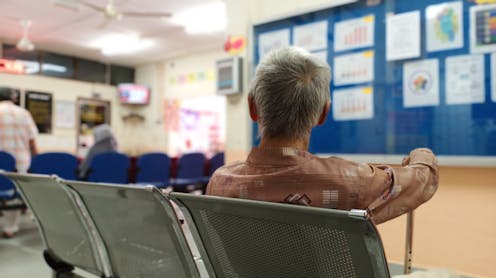Just because someone had COVID before they had a heart attack doesn’t mean it was the cause
- Written by Hassan Vally, Associate Professor, Epidemiology, Deakin University

Last week ABC journalist and physician Norman Swan suggested[1] the heart attacks of two high profile people over the past year were unlikely to be a coincidence. The suggestion was that it was too unlikely two people in their 50s died of heart attacks after being infected with COVID for these events not to be connected.
However, without access to any other information about the health of these people, there was no basis for making this connection. And it later emerged one of the two may never have had COVID.
To Swan’s credit, he apologised immediately. But it highlights that no matter how well informed we are, all of us can be tripped up by errors of logic. These “logical fallacies” can cause us to believe with great conviction things that are either not true or highly unlikely.
The logical fallacy at play here is called the post hoc fallacy. This is one of the most common errors in thinking we are susceptible to when trying to make sense of events. It’s also one of the most frequent strategies bad actors use when intentionally spreading false information – which there has been no shortage of throughout the pandemic.
So what exactly is a post hoc fallacy?
The fallacy is that just because one event occurs before another, the first event must be the cause of the second.
One example of this is when a black cat crosses our path and something bad happens later that day, we immediately connect these two events. There is also an element of confirmation bias here – if we have preconceived beliefs, we’re more likely to make particular connections.
Read more: Cognitive biases and brain biology help explain why facts don’t change minds[2]
During the pandemic, this error in logic has been used to argue the case for groups holding diametrically opposite views. With around two-thirds[3] of Australians previously infected with COVID and 95% double-dose vaccinated[4] against the disease, almost any medical incident is going to be preceded by either COVID infection or vaccination, and thus can be blamed on these events.
In particular, those opposing COVID vaccines continually suggest serious medical events occurring in high-profile people must have been due to COVID vaccines, simply because those affected had been vaccinated. This simple tactic is incredibly effective, as it leverages the greatest ally of those who spread false information – fear.
However it’s not scientifically credible to infer one medical event caused the other solely on the basis of one event occurring before another. Working out the cause of a medical event requires much more evidence.
COVID and heart attacks
Two-thirds[6] of Australians, or around 16.5 million people, have been infected with COVID since the beginning of the pandemic.
Heart disease is the leading killer of Australians, with more than 50,000[7] people having heart attacks each year. More than 10% of these are fatal.
So the fact that someone who had a heart attack may have previously been infected with COVID is not that surprising.
However, this does not discount the fact that SARS-CoV-2, the virus that causes COVID, may affect your risk of having a heart attack.
We already accept that COVID infection has more immediate effects on the heart[8]. Emerging evidence[9] also suggests there’s an increased frequency of future cardiovascular disease such as heart attack, stroke and heart failure after COVID infection. While this early evidence needs to be interpreted with some caution, these findings are clearly concerning.
Read more: Even mild COVID raises the chance of heart attack and stroke. What to know about the risks ahead[10]
Avoiding the post hoc fallacy
Its important that we resist the urge to assume that one event causes another just because an event occurred before another.
Its also important to understand that those seeking to mislead you will use a number of tactics to induce you to make this and other errors of reasoning.
In recognising logic fallacies the hope is that you will be less susceptible to being manipulated by those spreading false information.
References
- ^ suggested (www.theguardian.com)
- ^ Cognitive biases and brain biology help explain why facts don’t change minds (theconversation.com)
- ^ around two-thirds (www.ncirs.org.au)
- ^ 95% double-dose vaccinated (www.health.gov.au)
- ^ National Cancer Institute/Unsplash (unsplash.com)
- ^ Two-thirds (www.ncirs.org.au)
- ^ more than 50,000 (www.aihw.gov.au)
- ^ immediate effects on the heart (www.bhf.org.uk)
- ^ Emerging evidence (www.nature.com)
- ^ Even mild COVID raises the chance of heart attack and stroke. What to know about the risks ahead (theconversation.com)
















